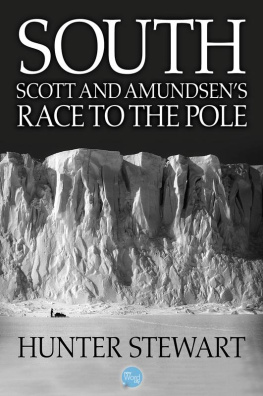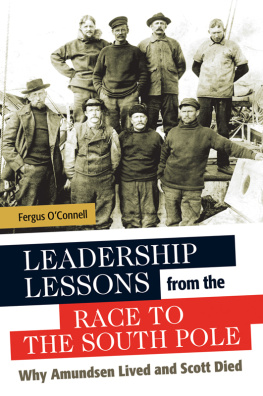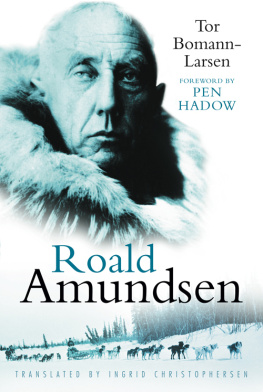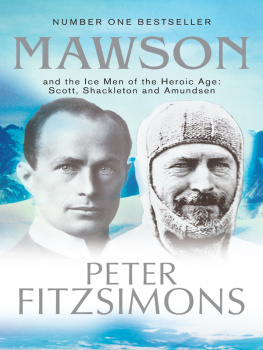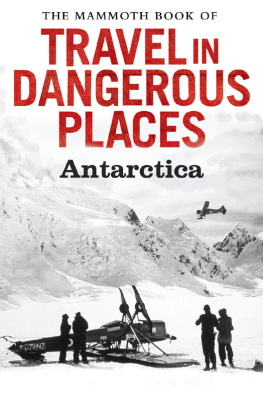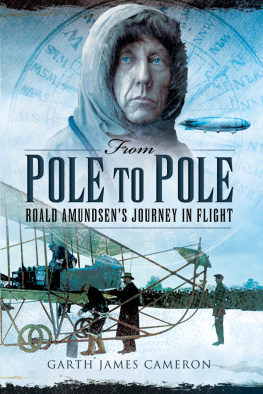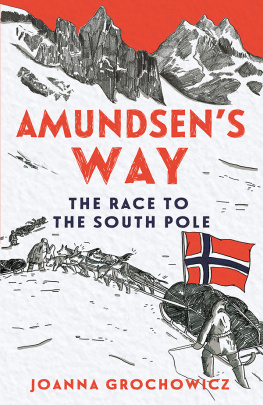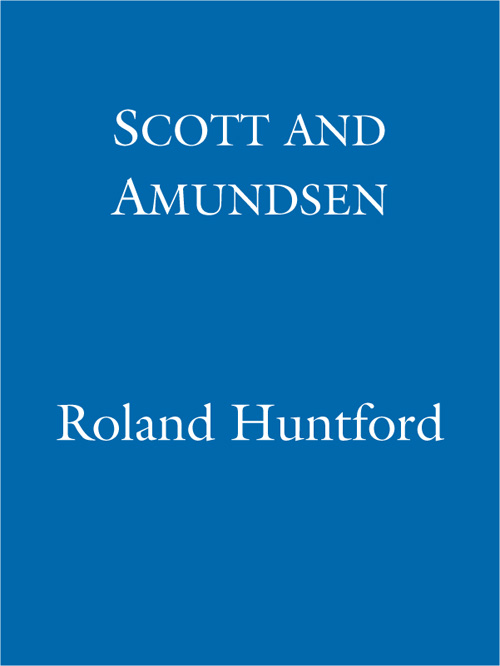P AUL T HEROUX
RACERS TO THE POLE
What most people know of the conquest of the South Pole is that Captain Scott got there and then died heroically on the return journey; that when the polar party lay tent-bound and apparently doomed, Captain Oates unselfishly said, I am just going outside and may be some timeand took himself out to die, so that his comrades might live. That Scott represented self-sacrifice and endurance, and glorious failure, the personification of the British ideal of plucky defeat. Scotts expedition was essentially scientific; he was beset by bad weather. Roald Amundsen is sort of an afterthought: Oh, yes, the dour Norwegian actually got to the pole and planted his flag first, but thats a detail; he was very lucky and a little devious. So much for the pole.
Roland Huntford, in his The Last Place on Earthits original title was Scott and Amundsenproves all of this wrong, and much more to boot. Thus, the kerfuffle.
It is a measure of the power of this book that when it first appeared in Britain, it caused an uproar; and a few years later, a television series that was adapted from it created a flurry of angry letters to newspapers and a great deal of public discussion, in which the book was rubbished and its author condemnedeven vilified in some quarters for suggesting that Fridtjof Nansen was engaged in a sexual affair with Kathleen Scott while her husband lay freezing in his tent.
The polar quest was not just exploration, a journey of discovery, it was indeed (although Scott tried to deny it) an unambiguous race to be the first at the South Pole. National pride was at stakeNorwegian and British; two different philosophies of travel and discovery, skis versus trudging, dogs versus ponies, canvas and rubberized cloth versus fur anoraks and Eskimo boots; two culturesNorse equality (a little republic of explorers, as one of the Norwegians wrote) versus the severe British class system; and two sorts of leadership, more particularly, two different and distinct personalities, Roald Amundsens versus Captain Scotts.
The great surprise in the book is that Amundsen is not a moody, sullen Scandinavian, but rather a shrewd, passionate, approachable, thoroughly rational man who tended to understate his exploits, while Scottquite the reverse of the British stereotypewas depressive, unfathomable, aloof, self-pitying, prone to exaggerate his vicissitudes. Their personalities determined the mood of each expedition: Amundsens was spirited and cohesive, Scotts was confused and demoralized. Amundsen was charismatic and focused on his objective; Scott was insecure, dark, panicky, humorless, an enigma to his men, unprepared; and a bungler, but in the spirit of a large-scale bungler, always self-dramatizing.
It was Scott who suited the sermons Mr. Huntford writes. He was a suitable hero for a nation in decline. Amundsen had made the conquest of the pole into something between an art and a sport. Scott had turned polar exploration into an affair of heroism for heroisms sake. Mrs Oates, who was privy to a running commentary on the Scott expedition through her sons letters homeOates was throughout a remarkable witnesscalled Scott the murderer of her son. As for Oatess opinion, I dislike Scott intensely, he wrote in Antarctica.
Far from being a belittler or having an ax to grind about the phlegmatic British, Mr. Huntford merely points out that Britain took Scott as a necessary hero; it is not the British character that is being assailed in this book, but the process by which Scott took charge of the disastrous expedition. Scott was the problem. Though he knew little of actual command (and was unsuited to it), Scott was ambitious, seeking advancement, even glory, in the Royal Navy. He was a manipulator, he knew how to find patronswhich he did in Sir Clements Markham, a wonderful sly subsidiary character in the narrativevindictive, pompous, queenly, attracted to Scott more for Scotts being strangely epicene. The femininity in Scotts personality was remarked upon by one of Scotts own men, Apsley Cherry-Garrardthe youngest in the expedition; Cherry-Garrard also mentions how they had erroneously rated Amundsen a blunt Norwegian sailor rather than as an explorer of the markedly intellectual type, sagacious and weather-wise.
The weather has always been regarded as the determining factor in Amundsens success and Scotts failure. Yet it offered little advantage: conditions were pretty much the same for both expeditions; the fact was that Amundsen was far better prepared, and Scott left no margin of safety for food, fuel, or weather. In a journey of four months Scott had not allowed for four days bad weather. Parallel diary entries in a given period show Amundsen hearty and bucked up as he skis through fog, and just behind him Scotts diary shows him fatigued, depressed, complaining, slogging along. Mr. Huntford sees this as a difference not in style but in approach:
Scott expected the elements to be ordered for his benefit, and was resentful each time he found they were not. This was a manifestation of the spiritual pride that was Scotts fatal flaw.
The difference between the two rivals is expressed in the way each called on the Deity. Scott did so only to complain when things went wrong; Amundsen, to give thanks for good fortune. In any case, Scott was an agnostic and believed in science; Amundsen was a Nature-worshipper. For that reason alone, Amundsen found it easier to accept the caprice of blizzard and storm. He and his companions were in tune with their surroundings; they were spared the angst that tormented Scott and, through him, pervaded British expedition.
The Norwegian expedition, though vastly underfunded, were all of them skiers, had a better diet, simpler but more sensible gear, and the bond of friendship. Skis were a mere novelty to the non-skier Scott, whose class-ridden expedition had plenty of money and patrons. He had planned to depend upon ponies and motorized sledges, but when these proved useless he was reduced to hauling sledges by hand. In the base camp, long before Scotts party set out for the pole, one of Scotts mensignificantly it was the one Norwegian, Tyrggve Granwrote, Our party is divided, and we are like an army that is defeated, disappointed and inconsolable.
Amundsen had heart and compassion but could also be an odd fish in his way. He had a prejudice against doctors. He wouldnt take one on an expedition. He believed that a doctor created sickness, Mr. Huntford writes, and, because of his priest-like role, meant divided command. On the other hand, [his] men were master navigators. Only one of Scotts men could navigate and he was not taken on the polar party, though at the last moment Scott decided to take an extra man, which meant that rations would inevitably be short.


